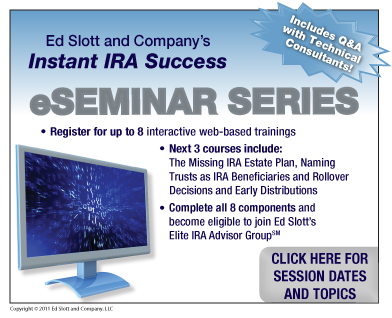
In This Update:
- Income Tax Day is Approaching
- Ruling to Remember: Beware of Prohibited Transactions
- Q of the Month: I Forgot to Take My RMD
Resources
- Ed as a Speaker
- Ed Slott's IRA Advisor Newsletter
- Shopping Cart
- Discussion Forum
- IRA Resources
- IRA and Tax Tables
Assistance
?? Question of the Month: I forgot to take my Required Minimum Distribution. Now what?
Q: I forgot to take my Required Minimum Distribution for 2010, and I am in a panic. Did I make an unfortunate and, in the long run, costly mistake? Is there anything I can do today to avoid the 50% penalty?
A: The very first thing you should do is immediately take what your 2010 Required Minimum Distribution would have been. You should then file Form 5329 with your 2010 income tax return and attach a letter asking for a waiver of the 50% penalty. Indicate in the letter that when you realized you did not take your RMD in 2010, you distributed the missed RMD. Don't be surprised if you don't hear from the IRS because you corrected your error.
TIME IS RUNNING OUT!
REGISTER BEFORE THE LARGEST IRAS PASS YOU BY
GROUP DISCOUNTS AVAILABLE! CONTACT US AT 215-557-7022 FOR MORE INFORMATION
More Clients Will be Filing Form 8606
|
The March issue of Ed Slott's IRA Advisor Newsletter talks about the avalanche of questions coming in regarding Form 8606, which is tied into 2010 Roth conversions. Form 8606, "Nondeductible IRAs," is where you or your clients will report Roth conversions. This form has been around for yeas, but it will be more popular this year because of the two tax law changes that benefited those wanting to convert. 1) Income restrictions were repealed for 2010 and all later years. |

|
RECEIVE AN ADVISOR ACTION PLAN IN ED SLOTT’S IRA ADVISOR NEWSLETTER | |
Inside Ed Slott's IRA Advisor NewsletterReporting Roth Conversions IRS Form 8606 Q and A
Guest IRA Expert
If you are not already an Ed Slott's IRA Advisor Newsletter subscriber, you can preview past issues before subscribing. |
|
|
||
|
|||






 March Key Focus
March Key Focus Ruling to Remember
Ruling to Remember